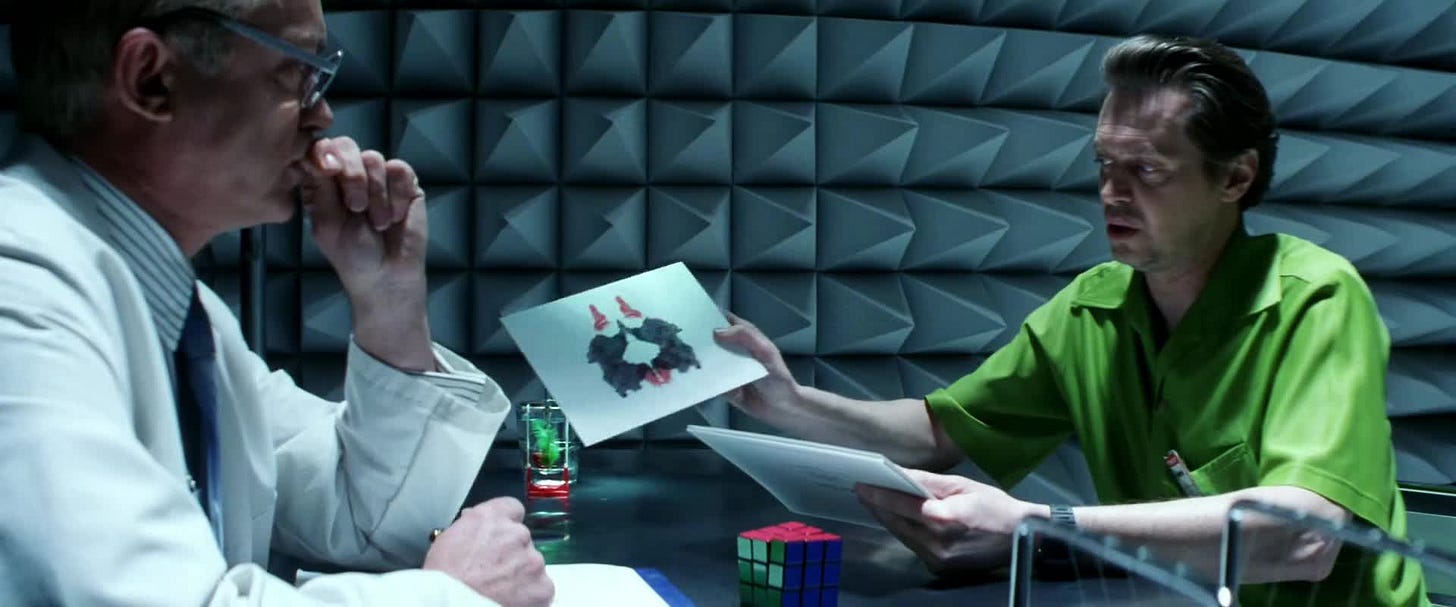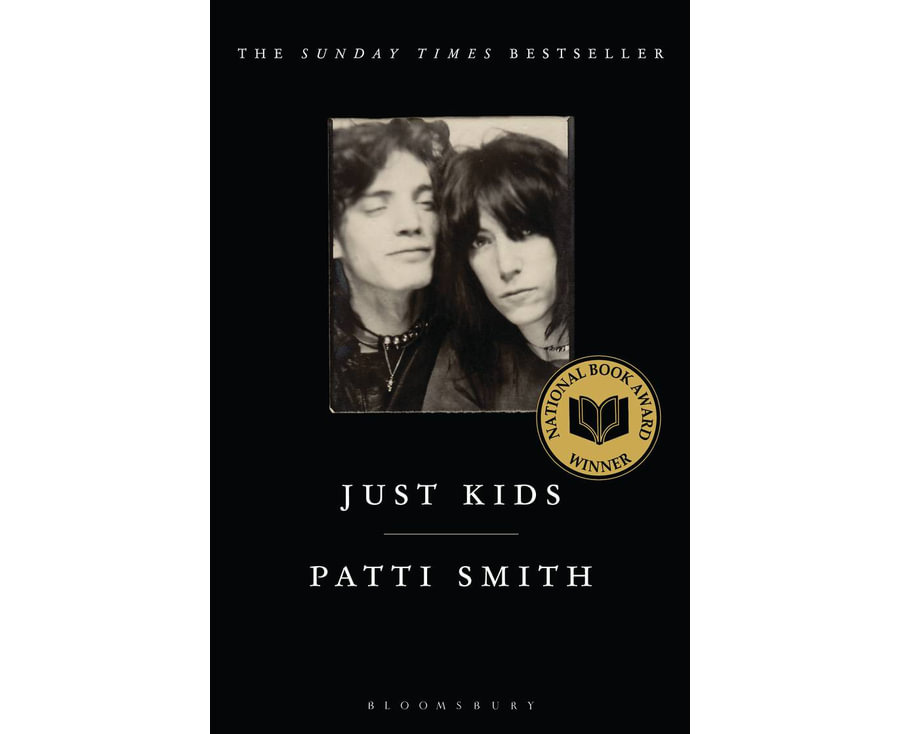Kvetching at the movies
The Whale, Patti Smith and Prometheus
Space factories: Varda has deployed the world’s first space factory. Here is a big write up of it at Not Boring by Packy McCormick. I interviewed founder Delian Asparouhov when Varda was little more than a twinkle in his eye.
[Warning: Spoilers]
I’m going to kvetch to you about movies I’ve seen recently.
Whenever watching a movie with the wife, there comes a moment when I turn to her and ask: You know what this movie’s really about? Whereby she rolls her eyes and I tell her. She thinks my theories are generally bullshit, that I project my own psyche and worldview on every film like Steve Buscemi’s sex-pest character in Armageddon who sees breasts in every rorschach image.
Puss in Boots? The domestication of man. Top Gun: Maverick? American decline. And so on. But isn’t everyone with an opinion and blog constantly, horribly telling on themselves?
So I won’t share with you a catalogue of films I’ve been watching, but rather just those that struck a nerve in some strange way and why.
So you get to be my wife today. Today’s kvetch is about The Whale (2022) (with a cameo from non-film Patti Smith’s memoir Just Kids) and Prometheus (2012). There will be more.
The Whale (2022)
The Whale is a lab-manufactured Oscar contender: a poor, fat, gay mid-Westerner cast in a tragic play (it worked — it won a bunch of awards). Nominally anti-Christian, really it’s deeply and subversively pro-Christian.
You abandon your daughter, your family, your God — and you go to Hell.
The Whale caricatures modernity’s idolisation of the self. He didn’t need God, he didn’t need anyone but me, whimpers the Whale about his dead former lover, perfectly encapsulating the paramount self-aggrandisement of liberalism. God is dead and instead of Him there is only your own bloated husk.
BE AUTHENTIC the fat man mumbles again and again to his bored fake college students and to his abandoned daughter. To the very end he is selfish, making his daughter read to him a relic of herself from before his Fall as he dies. Stuck in his room with cardio-congestion tightening its grip over his heart for days, he is a perverted self-pitying Jesus figure hanging on the cross waiting for death. In his final moments he lifts himself up (unassisted!) and drags himself to his daughter, step by step, until he reaches her and dies. Light floods the screen and he is lifted to Heaven — in the telling of the story. But we know he has Fallen. One wonders if the film is not intended to be from the perspective of his fevered dying mind, so fantastically and unbelievably sympathetic it could be (on its face) to his indulgence and cruelty.
The Whale epitomises male entitlement: wide-eyed naivety in the face of broken relationships and weaponised incompetence. He has a small fortune (for his small town context), yet withholds cash from his fellow-bereaved nurse friend, who is bound to him in tragedy, and cares endlessly for him. His ex-wife — who he abandoned for a man — is more full of grace than we can imagine.
Do you ever get the feeling people are incapable of not caring? People are amazing, he blurts out with his cow-eyes lolling out of his head. He, who has never given anything of himself, but has swallowed the souls of everyone around him, is shocked in constant amazement by his altruistic universe. The women around him pour their souls into him in the unconditional way only women can and he gives them nothing back.
Ironically it is the only genuinely Christian character — the fake missionary petty-thief stoner — who is Saved. It is the stoner’s Christian parents who are grateful to hear of him — mal-intentionally through the Whale’s broken daughter — and forgive him.
Walt Whitman, the literary saint of America and the Grand Homo-Onanist is also the saint of this film, explicitly recalled and defiled in the small hell of the Whale’s home. Melville too — yet this white Whale is shrunken and shriveled besides his literary cousin. He is an inverted parody of Melville’s and Whitman’s grand American visions — self-beached, grimly masturbating, bloviating advice to people he’s let down, and eating to death inside the confines of his tiny stage.
Just Kids
I read Patti Smith’s memoir Just Kids in a similar way to The Whale (albeit I liked her more), so whilst it’s not a movie I’ll comment on it here. She begins life as a Catholic, and then descends into Hell — which makes up the bulk of the story of her life. A misbegotten pregnancy at 19, she adopts the child out. Her true love Robert — about whom the memoir is really about, not her husband and father of her subsequent children — sells himself to men, gives Smith gonorrhea and eventually dies of AIDS (the things women suffer for love!). Occasionally during this grim story of the Fallen, she recalls this saint or that, as if seeing hints of heaven above through the fire and brimstone around her. And we love and pity her as we do all the damned.
But she is more like Orpheus among the damned than one of the damned herself — unlike the Whale. Here she is, towards the end of her loving story, shockingly clear-eyed yet somehow almost unaware of the literal hell she inhabits:
That night we walked down Christopher Street to the river. It was two in the morning, there was a garbage strike, and you could see the rats scurrying in the lamplight. As we moved toward the water, we were met with a frenzy of queens, beards in tutus, leather saints and angels. I felt like the traveling preacher in The Night of the Hunter. Everything took on a sinister air, the smell of patchouli oil, poppers, and ammonia. I became progressively more agitated.
Robert seemed amused. “Patti, you’re supposed to feel love for everybody.” But I couldn’t relax. Everything seemed so out of hand, silhouetted by orange and pink and acid green auras. It was a hot steamy night. No moon or stars, real or imagined.
He put his arm around my shoulders and walked me home. It was nearly dawn. It took me a while to comprehend the nature of that trip, the demon vision of the city. Random sex. Trails of glitter shaking from muscled arms. Catholic medals torn from shaved throats. The fabulous festival I could not embrace.
Have you noticed how women’s memoirs can often be about their man? I only have Patti Smith’s and Marina Abramovic’s in mind — but I can’t think of a single man’s memoir I’ve read where he isn’t obviously the protagonist (which seems natural for a memoir). Both Smith and Abramovic seem subsumed into their anti-hero-partners (they’re always anti-heroes somehow — completely unlikeable but to these women). Another commentary on female agency? Smith declining her first record deal because she didn’t feel she deserved it — she thought it came too easy — is also something you’d only find in a woman’s memoir.
Prometheus (2012)
Doesn’t everyone want to kill their parents?
— David, cyborg
Serious question: how does a director like Ridley Scott misfire so badly? Clearly enough money to create something that looks beautiful and and casts stars. They can’t afford the writers? Honestly, I swear I would do a better job. Hire me! I kvetch for free at night — you think I’m not deranged enough to write something for Ridley Scott for free? Sounds awesome.
And yet this film was not.
But it was comically Freudian. It’s a recursive tale of parental conflict, of Saturn eating his children and them fighting back, of Oedipus killing his father and impregnating his mother. Prometheus made man and was tortured for eternity in reward. In Scott’s namesake film, aliens called Engineers created Man. They changed their minds and created a monster swarm to kill Man. But the monster swarm turned on their creators. A kazillionaire genius (Guy Pearce) flies to space with his daughter (Charlize Theron) to find the secret of life. He gets his surrogate son cyborg David (Michael Fassbender) to implant one of the crew with one of the monster swarm. She gives birth to it (via makeshift caesarian). That monster ends up killing one of the Engineers. The Engineers kill the evil kazillionaire father. I think I have that right, but don’t sweat the detail.
David: doesn’t everyone want to kill their parents?
And tell me you’re terrified of women without telling me you’re terrified of women:
Seriously, it’s over for Man:







Scott got too in the weeds with the creation myth